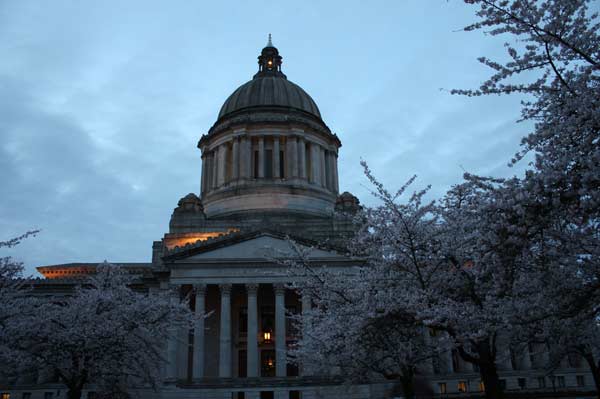WA lawmakers button down hard-times session
Washington lawmakers are heading back to their home districts after completing a brutal recession-era 135-day session. Budget cutbacks, including salaries of state employees and teachers and budgets of virtually every area of government, were the rule of the day as lawmakers grappled with a budget gap of billions.
Cuts and freezes totaling $4.6 billion will affect K-12, higher education, “safety net” programs, and a variety of state services, from parks to prisons. The $32 billion two-year budget takes effect July 1, and will include hundreds of layoffs and a pay cut of 3 percent and higher health care costs for state workers.
The operating and construction budgets passed in the waning hours of the session and enjoyed bipartisanship support, particularly in the Senate, where the two parties crafted the spending plans, pension reform and workers’ compensation overhaul. Governor Gregoire called the session the toughest in recent memory, but hailed reforms and “a new spirit of bipartisanship” in Olympia.
The budget leaves over $700 million in reserves in case there are further revenue problems as the state and nation slowly pull out of the worst recession in decades.
The budget sweeps away the Heritage Center savings account that had been authorized previously as seed money for a new facility on the Capitol Campus to consolidate the State Archives, State Library, education center and history exhibits. The $13 million was redistributed to the state history museums in Tacoma and Spokane, the state Arts Commission and other programs that were stripped of their General Fund support. The fund source will not be available in two years.
The budget also made deep cuts to the State Library and eliminated the state Productivity Board. Cuts will also be required in other areas of the Office of Secretary of State.
While deeply disappointed in the final budget, Secretary of State Sam Reed said he was grateful for strong legislative support for his proposals to:
–Enhance the state’s voter services for military and overseas voters by allowing electronic return of voted ballots, and moving the state Top 2 Primary two weeks earlier in August (starting next year) to make sure these voters get their ballots mailed out 45 days before Election Day.
–Make Washington the second state in America, after Oregon, to switch entirely to vote-by-mail.
–Suspend the state’s presidential preference primary for 2012, saving the taxpayers $10 million.
–Improve the Charitable Solicitations Act.
–Enhance the state Corporations Division’s customer service by allowing electronic notices.
